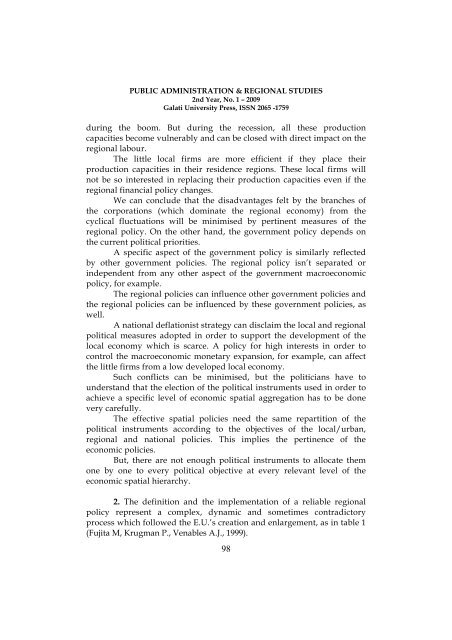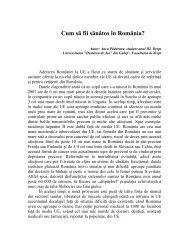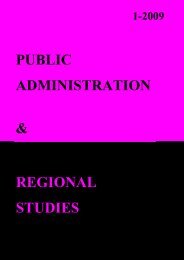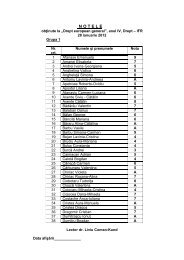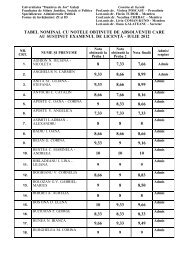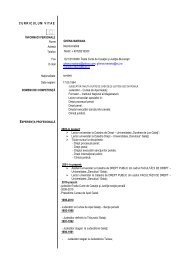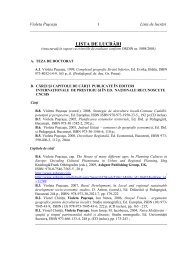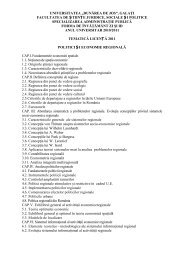regional studies public administration - Facultatea de Drept ...
regional studies public administration - Facultatea de Drept ...
regional studies public administration - Facultatea de Drept ...
Create successful ePaper yourself
Turn your PDF publications into a flip-book with our unique Google optimized e-Paper software.
PUBLIC ADMINISTRATION & REGIONAL STUDIES<br />
2nd Year, No. 1 – 2009<br />
Galati University Press, ISSN 2065 -1759<br />
during the boom. But during the recession, all these production<br />
capacities become vulnerably and can be closed with direct impact on the<br />
<strong>regional</strong> labour.<br />
The little local firms are more efficient if they place their<br />
production capacities in their resi<strong>de</strong>nce regions. These local firms will<br />
not be so interested in replacing their production capacities even if the<br />
<strong>regional</strong> financial policy changes.<br />
We can conclu<strong>de</strong> that the disadvantages felt by the branches of<br />
the corporations (which dominate the <strong>regional</strong> economy) from the<br />
cyclical fluctuations will be minimised by pertinent measures of the<br />
<strong>regional</strong> policy. On the other hand, the government policy <strong>de</strong>pends on<br />
the current political priorities.<br />
A specific aspect of the government policy is similarly reflected<br />
by other government policies. The <strong>regional</strong> policy isn’t separated or<br />
in<strong>de</strong>pen<strong>de</strong>nt from any other aspect of the government macroeconomic<br />
policy, for example.<br />
The <strong>regional</strong> policies can influence other government policies and<br />
the <strong>regional</strong> policies can be influenced by these government policies, as<br />
well.<br />
A national <strong>de</strong>flationist strategy can disclaim the local and <strong>regional</strong><br />
political measures adopted in or<strong>de</strong>r to support the <strong>de</strong>velopment of the<br />
local economy which is scarce. A policy for high interests in or<strong>de</strong>r to<br />
control the macroeconomic monetary expansion, for example, can affect<br />
the little firms from a low <strong>de</strong>veloped local economy.<br />
Such conflicts can be minimised, but the politicians have to<br />
un<strong>de</strong>rstand that the election of the political instruments used in or<strong>de</strong>r to<br />
achieve a specific level of economic spatial aggregation has to be done<br />
very carefully.<br />
The effective spatial policies need the same repartition of the<br />
political instruments according to the objectives of the local/urban,<br />
<strong>regional</strong> and national policies. This implies the pertinence of the<br />
economic policies.<br />
But, there are not enough political instruments to allocate them<br />
one by one to every political objective at every relevant level of the<br />
economic spatial hierarchy.<br />
2. The <strong>de</strong>finition and the implementation of a reliable <strong>regional</strong><br />
policy represent a complex, dynamic and sometimes contradictory<br />
process which followed the E.U.’s creation and enlargement, as in table 1<br />
(Fujita M, Krugman P., Venables A.J., 1999).<br />
98


